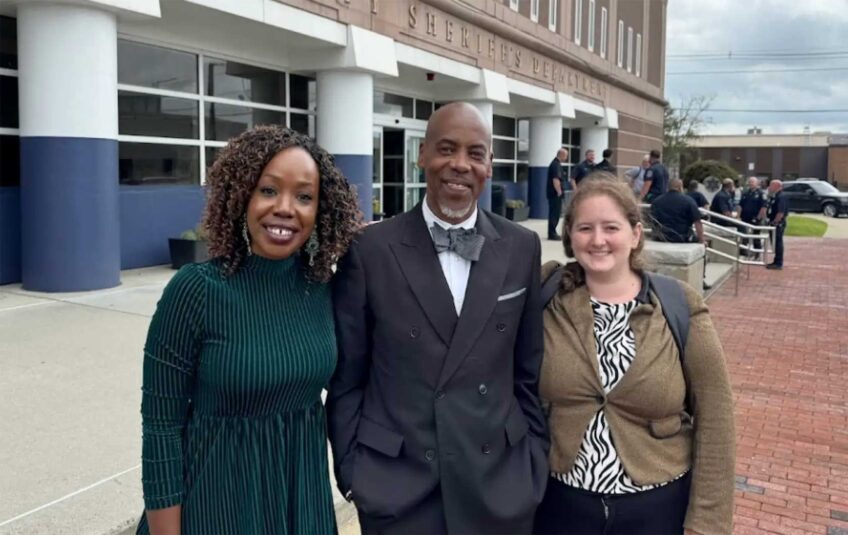
With just five months left in Gov. Charlie Baker’s administration, Baker and Education Secretary James Peyser made a move that raised eyebrows, replacing two members of the Board of Elementary and Secondary Education (BESE), the body that votes on state policy and decides who will serve as commissioner of the Department of Elementary and Secondary Education (DESE).
Both of the outgoing members, Amanda Fernandez and James Morton, had terms that had expired, but politicians commonly leave government positions unfilled in the months before a new administration takes over as a courtesy.
Their replacements, management consultant Farzana Mohamed and Tricia Canavan, CEO of an economic development nonprofit, both come from the business world.
Baker and Peyser’s move in July effectively put the outgoing administration’s stamp on state education policy for at least the next few years, lessening Governor-elect Maura Healey’s ability to influence critical decisions such as whether to retain Baker appointee Jeff Riley as education commissioner — a power that rests in the hands of BESE members.
“If Baker and Peyser had been gentlemen, they would ignore the fact that [the board members’] terms had expired,” said American Federation of Teachers President Beth Kontos.
Kontos noted that both members were against putting Boston Public Schools (BPS) in receivership, a move in which the DESE would have taken the district out of the control of the BPS superintendent and School Committee and appointed a superintendent who would report to Riley.
Regardless of the reason for their dismissal, in the case of Fernandez, it was rather abrupt. She reportedly received a phone call from Peyser telling her that her term was up and that she should not come to the June 28 meeting of the board.
Then, in August, the board voted to increase the minimum score on the state’s MCAS exam to meet state graduation requirements, pushing through another policy change that the Healey administration will have to implement and own.
Kontos sees in the policy change, coming in the 11th hour of Baker’s and Peyser’s eight years in office, an effort to double down on the corporate education reform principles they have long supported — using MCAS exam scores as the primary means to measure the efficacy schools and school districts, and pushing school takeovers in the predominantly low-income schools where scores are low.
“I think under the Baker administration, they are pro-testing, pro-punishment and pro-business,” Kontos said.
What will DESE do?
On her campaign website, Healey staked out positions at odds with those Baker and Peyser have backed. The website notes that Healey opposed the 2016 Ballot Question 2, which would have lifted the cap on charter schools in Massachusetts. Baker backed the question, which lost by a significant margin at the ballot box.
Healey also says she supports the Massachusetts Consortium for Innovative Education Assessment, a group that is looking to move beyond the state’s current focus on the MCAS exam as the main means of assessing schools and districts.
With the recent board appointments, Baker’s and Peyser’s philosophy may stick around a while yet.
DESE is facing significant challenges. The agency has put three entire school districts in receivership — Lawrence, Holyoke and Southbridge. DESE also put a cohort of schools in Springfield into a so-called empowerment zone, where schools are largely free of district control. But so far, none of the interventions has resulted in substantive progress. Students at the nine schools in the Springfield Empowerment Zone Partnership test well below the district average, and Southbridge, Holyoke and Lawrence (which has been in receivership for more than 10 years) all score in the bottom 10% of schools statewide by DESE’s own metrics.
Jack Schneider, a professor of education at UMass Lowell, attributes the agency’s failure to move the needle on the districts it has put in receivership to the thinking behind the 2010 Achievement Gap Act, which gave DESE the power to put schools and districts in receivership.
“It assumes that the state has more capacity than it really has — that the state can understand what is happening inside districts and inside of schools,” Schneider said. “The state has limited tools for intervening if it thinks what is happening is problematic.”
Schneider is not alone in his skepticism of DESE’s efficacy. Over the summer, when Riley and BESE board members were threatening Mayor Michelle Wu with an intervention into BPS in response to longstanding issues of equity and inadequate services for students with disabilities, many publicly questioned the capacity of the state agency to run a district with nearly 50,000 students.
Emphasis on testing
The testing and interventions that DESE administers are part of a broader education reform movement driven largely by people from the business world, many of whom are leaders and consultants who work with large corporations and believe schools should be run more like businesses.
Well-funded think tanks spin out ideas such as the Center for Reinventing Education’s portfolio model, which Boston subscribed to in the early years of the administration of former Mayor Martin Walsh. That model held that schools in a district should be managed like a stock portfolio, with schools in which students perform poorly on standardized tests being closed while schools with higher test scores receive more investments.
Schneider said the education reform movement ultimately puts the blame for poor test scores on teachers and schools, without regard for the broader correlation between test scores and parental incomes or other factors that come into play outside the school building.
“One of the core assumptions of corporate education reform over the last three decades is that educators aren’t trying their hardest,” he said. “Test-based accountability assumes that putting more pressure on schools will produce better results.”
While Boston officials veered away from corporate education reform models in the later years of the Walsh administration, the main tenets of the movement — testing and accountability — are still very much operational at the state level.
Kontos and other union officials say school districts serving high-poverty populations would be better served if they received the resources necessary to implement proven strategies, such as universal pre-kindergarten.
That’s another area where Healey has aired her views. On her campaign website, she pledged to advocate for federal funding for early education and care and said she supports making child care free for the state’s lowest-income families.
More significantly, she says she supports fully funding the Student Opportunity Act, legislation that would pump hundreds of millions of dollars in education aid to the state’s lowest-income districts.
Schneider said Healey may be ready to make a clean break from the education policies state officials experimented with during prior administrations.
“I don’t think she has preconceived notions about the best way to strengthen schools,” he said. “I think there’s a lot of potential to move past what we’ve been stuck with over the last three decades.”







